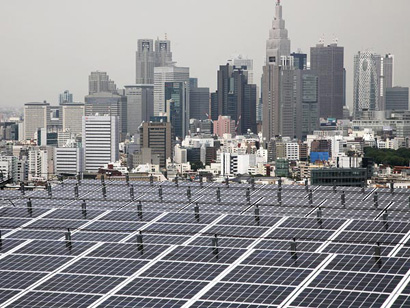The Japanese Government seeks to further bolster its energy security through stronger economic relations with the UAE in general, and Abu Dhabi in particular as the emirate already meets around 25 per cent of Japan's demand on crude oil, and recently has become Japan's partner in a new renewable energy project platform.
 Senior officials of Japan's state owned Development Bank of Japan said Abu Dhabi which accounts for around 25 per cent of Japan's crude oil imports remains important for Japan's energy security. "As Abu Dhabi started to focus more on the renewable energy in 2006, and as Japan owns advanced environmental and energy technologies, we wish to improve the relationship between the two countries. We wish that Masdar, Abu Dhabi's renewable energy company, would utilise these technologies," said Takahiro KATO, Senior Vice President of Development Bank of Japan.
"Around 25% of Japan's oil imports come from Abu Dhabi, so the UAE is an important country for Japan's energy security," Kato said. Especially after the great earthquake and Tsunami which hit Eastern Japan in March 2011, Japan's energy policy was reviewed in the process, and the importance of oil for Japan remains the same, according to the bank which is solely owned by the Japanese government with total assets of around 15 trillion Yen. In terms of private corporations and projects related to DBJ, 20 per cent of Japan's Comso Oil company is now owned by an Abu Dhabi sovereign fund, the International Petroleum Investment Company (IPIC). "Partly because of this stock ownership and partly because of the importance of oil imports, concessions in Abu Dhabi are extremely important, not only for Japan's energy situation in general, but also for private corporations such as Comso Oil", the DBJ senior official explained. "The mission of DBJ is lend money to private corporations such as Cosmo Oil. When it comes to business stability, it is very important for such corporations to maintain interests in Abu Dhabi." "Around 25 per cent of our oil comes from the UAE. Part of the imported oil is turned into electricity and DBJ maintains a deep relationship with Japan's electric power companies," the Japanese official noted. Abu Dhabi's Masdar and DBJ "already have an actual business relationship. Back in 2009, we invested in the CleanTech Fund which is aimed at making investments in environmental technologies. We did not disclose the actual size of our investment in the Fund then," Kato said. DBJ also encouraged Japan's big corporations' to invest in the DB Masdar Clean Tech Fund, which was launched by Abu Dhabi's Masdar and Deutsche Bank in 2010. The fund seeks to build a diversified venture capital and private equity portfolio that will include some of the world's most promising and pioneering clean tech and renewable energy companies. "As DBJ is investing in a many different funds worldwide, it now has enough expansive expertise and knowledge to screen and make decisions on which funds to invest in." "After DBJ had decided to invest in Clean Tech Fund, Mitsubishi Heavy Industries, for example, decided to (get involved) and make investments. We believe that their decision was influenced by ours," the DBJ's senior official said. With very low credit risk, the UAE, and emirate of Abu Dhabi in particular, is among the non-OECD members targeted by DBJ's foreign investments as members of the Organisation for Economic Co-operation and Development (OECD) "have different credit risk." "We would like to make good investments. This is a quite sensitive issue, but even in Europe or OECD, the credit risk of some countries is high and low in others. Spain, Italy, Germany, UK, France have different credibility. That is why we would like to make a good choice of countries that are, in this sense, good," Kato said. Relaying on political support means that a good choice by the world's third largest economy to strategically invest in renewables and diversity the energy mix overseas is not necessarily based on the size of economies as guarantees for good returns. Masdar Capital and DBJ, in January 2012, planned to commit significant capital to a platform that will target stable returns from investing in renewable energy operating assets that use bankable technologies. "The reason why we (DBJ) do not want to select non-OECD such as China and India? of course these countries are steeply developing at this moment, but in these countries, unfortunately, investment in renewable energy rely on political support," Kato explained. For example, the cost of electricity generated from nuclear energy is cheap compared with the cost of renewables, such as energy and wind and solar energy. The market price of electricity is less than 10 Yen per kilowatt/hour, according to Kato who stressed that investment into wind and solar energy needs support, sponsorship and subsidies from governments. "In that sense, political stability is very important." "After Japan's great earthquake in March 2011 which led to shutting down nuclear plants, we are in the process of reconstruction. The support from Abu Dhabi and the UAE is at a critical stage, Kato said adding that a large number of solar energy projects are in place at the moment in Japan". "Since the start of new Feed-in Tariff system, the Japanese Ministry of Economy, Trade and Industry (METI) received 155 applications for mega solar projects by the end of August", according to the DBJ official.
MOST POPULAR IN LAST 24 HRS
MOST POPULAR IN LAST 7 DAYS
|